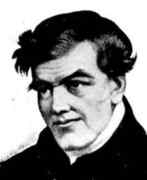Person: Peacock, George

George Peacock published his _Treatise on Algebra _ which attempted to give algebra a logical treatment comparable to Euclid's Elements.
Mathematical Profile (Excerpt):
- Only elementary mathematics was necessary for entry to Cambridge so, although he knew more advanced material, George excelled in the elementary topics taught at Richmond.
- Peacock completed his schooling in 1809, being ranked as the top student.
- In the autumn of 1809 Peacock matriculated as a student at Trinity College, Cambridge.
- It was then that Babbage, Herschel and Peacock first met each other.
- In 1812 Peacock graduated, placed second to John Herschel in the Mathematical Tripos examinations.
- In 1814 Peacock was awarded a fellowship to Trinity and, in the following year, he became a tutor and lecturer in Trinity College.
- The English translation appeared under the title An Elementary Treatise on the Differential and Integral Calculus (1816) and contained over 100 pages of added notes by Peacock and Herschel.
- Babbage, Herschel and Peacock began to work on this translation when the Analytic Society was formed, so it is reasonable to ask why it took so long for the translation to appear.
- Babbage, Herschel and Peacock certainly, although agreeing a common aim with the Analytical Society, nevertheless had rather different views on mathematics itself and how it should be taught.
- Only after the addition of the copious notes was Peacock happy to publish the book.
- The following year, 1817, Peacock was moderator of the Mathematical tripos examinations at Cambridge and used his position to further his reforms setting examinations using Leibniz's calculus notation.
- In the 1819 examinations Peacock again used Leibniz's notation, but this time with a considerable amount of applied mathematics, and thereafter it became standard practice.
- Peacock published Collection of Examples of the Application of the Differential and Integral Calculus in 1820, a publication which sold well and helped further the aims of the Analytical Society.
- With this book of problems solved using the Continental style of calculus, Peacock was making the Continental approach more palatable at Cambridge.
- Babbage had produced a number of manuscripts which were unpublished but he had discussed them with Peacock.
- In Treatise on Algebra, Peacock attempted to give algebra a logical treatment comparable to Euclid's Elements.
- (3) Arithmetic is only a special case of Algebra - a "Science of Suggestion" as Peacock put it.
- This fifth principle allowed Peacock to extend the rules of arithmetic using what he called the principle of the permanence of equivalent forms to give his symbolic algebra.
- In this respect Peacock's algebraic project was very different.
- In order to understand it, Peacock's work aspired to dismantle (to deconstruct) an existing area of mathematics.
- Peacock was then asked and he accepted although he restricted his report to Algebra, Trigonometry and the Arithmetic of Sines.
- Remarkably, in 1940, about 100 years after Peacock first published his Treatise on Algebra, the book was reprinted in two volumes.
- We should fill in some details of Peacock's career which we have passed over in looking at his algebra.
- Peacock published Observations on the Statutes of the University of Cambridge (1841) and The life of Thomas Young (1855).
- Peacock's book is therefore invaluable for quoting at length from now vanished original sources.
- On the other hand, Peacock is a prolix Victorian writer whose attempt to describe Young's scientific ideas entirely in words, without a single diagram ...
- Peacock does not seem to have had much respect for the doctors whom he consulted.
- Among the honors that Peacock received, we note that he was elected to the Royal Society of London in January 1818, and he joined the Royal Astronomical Society in 1820, the year it was founded.
- Although Peacock was not at the founding meeting, he had discussed the founding of the Society with Babbage and Herschel about ten days before that meeting.
- Peacock was a reformer for his whole life.
- Thompson had been one of Peacock's students at Trinity College.
Born 9 April 1791, Thornton Hall, Denton, County Durham, England. Died 8 November 1858, Pall Mall, London, England.
View full biography at MacTutor
Tags relevant for this person:
Astronomy, Origin England
Thank you to the contributors under CC BY-SA 4.0! 

- Github:
-

- non-Github:
- @J-J-O'Connor
- @E-F-Robertson
References
Adapted from other CC BY-SA 4.0 Sources:
- O’Connor, John J; Robertson, Edmund F: MacTutor History of Mathematics Archive
